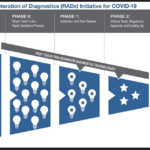The Medtronic COVID-19 Care Evaluation and Monitoring Solution provides in-home evaluation, remote monitoring, and care escalation support.
Category Archives: AZBio News
Moderna and Lonza Announce Worldwide Strategic Collaboration to Manufacture Moderna’s Vaccine (mRNA-1273) Against Novel Coronavirus
- Collaboration goal to enable manufacturing of up to 1 billion doses per year
- Technology transfer expected to begin in June 2020
- First batches of mRNA-1273 expected to be manufactured at Lonza U.S. in July 2020
- Collaboration leverages Lonza’s worldwide expertise in technology transfer and manufacturing
C-Path Appoints Two New Members to Board of Directors
TUCSON, Ariz., April 30, 2020 — Tucson-based Critical Path Institute (C-Path) today announced the appointment of two new members to its Board of Directors: James W. Newman, CPA, former Executive Chairman of Victory Pharma, Inc. and Tomas Salmonson, Ph.D., M.Sc., former Chair of the Committee for Medicinal Products for Human Use (CHMP), European Medicines Agency (EMA).
Valneva and Pfizer Announce Collaboration to Co-develop and Commercialize Lyme Disease Vaccine, VLA15
VLA15 is the only active Lyme disease vaccine program in clinical development today, and covers six serotypes that are prevalent in North America and Europe. The investigational multivalent protein subunit vaccine, VLA15, targets the outer surface protein A (OspA) of Borrelia, an established mechanism of action for a Lyme disease vaccine. OspA is one of the most dominant surface proteins expressed by the bacteria when present in a tick.Continue reading
Gilead Sciences Chairman & CEO Shares Open Letter on Remdesivir Data
On April 29, 2020, Daniel O’Day, Chairman & CEO, Gilead Sciences shared an Open Letter following the official press release containing data on Remdesivir and COVID-19.
“The results from the global, placebo-controlled trial run by the National Institute of Allergy and Infectious Diseases (NIAID) are positive. They show that patients with COVID-19 who received remdesivir recovered faster than similar patients who received placebo” O’Day writes. “There is still more work to do and remdesivir has not been approved, but all of us at Gilead are humbled by what these promising results might mean for patients. After years of research and hard work on remdesivir, there is relief and gratitude among our teams today that their efforts have been so worthwhile.”
Gilead Announces Results From Phase 3 Trial of Investigational Antiviral Remdesivir in Patients With Severe COVID-19
Study Demonstrates Similar Efficacy with 5- and 10-Day Dosing Durations of RemdesivirContinue reading
Dr. Theresa Cullen to join Pima County team as Public Health Director on June 1
Dr. Theresa Cullen is the new Pima County Public Health Director, effective June 1. Dr. Cullen has had a distinguished career as a public health physician, including retiring as a Public Health Service Officer from the federal government with the rank of Rear Admiral and Assistant U.S. Surgeon General.
Governor Ducey Provides Updated Guidance For Arizonans, Businesses
PHOENIX — Governor Doug Ducey today announced an extension of physical distancing measures while laying out a step-by-step approach to continue reenergizing Arizona’s economy. The Governor today issued an Executive Order extending Arizona’s Stay Home, Stay Healthy, Stay Connected Order until May 15, 2020.
The order also continues Arizona’s gradual economic reopening, allowing retail businesses to begin partial operations starting next week. Under the order, retail businesses currently not operating can begin curbside pick-up on Monday, May 4, followed by expanded in-person operations on Friday, May 8 as long as they implement social distancing and sanitation measures established by the United States Department of Labor or the Arizona Department of Health Services.Continue reading
C-Path ePRO Consortium and PRO Consortium Announce COVID-19 Risk Assessment and Mitigation Strategies
Recommendations provided for sponsors and eCOA providers to facilitate the continued collection of PRO data in clinical trials.Continue reading
NIH launches the Rapid Acceleration of Diagnostics (RADx) Initiative.
- NIH mobilizes national innovation initiative for COVID-19 diagnostics
- Initiative aims to speed delivery of accurate, easy-to-use, scalable tests to all Americans.
- With a $1.5 billion investment from federal stimulus funding, the newly launched Rapid Acceleration of Diagnostics (RADx) initiative will infuse funding into early innovative technologies to speed development of rapid and widely accessible COVID-19 testing
- NIH is urging all scientists and inventors with a rapid testing technology to compete in a national COVID-19 testing challenge for a share of up to $500 million over all phases of development.

